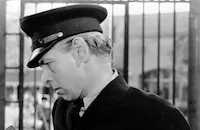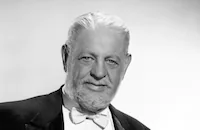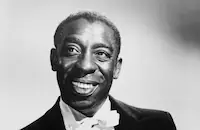After the Dance
Brief Synopsis
Cast & Crew
Leo Bulgakov
Nancy Carroll
George Murphy
Thelma Todd
Jack La Rue
Arthur Hohl
Film Details
Technical Specs

Synopsis
After Jerry Davis accidentally kills Alberto, who has forced his way into the dressing room of Mabel Kane, Jerry's partner in a dance act, she refuses to speak in his defense. As a result, the district attorney persuades Jerry to plead guilty to manslaughter, and he is sentenced to prison. Assigned to the lime pits, Jerry must share a cell with Mitch and Danny O'Neill. In the prison yard, Mitch beats up Jerry, who is blamed for the incident. The understanding warden makes Jerry a trustee, however, and assigns him to drive a truck with Danny. When Jerry receives a telegram saying that his mother is dying, the warden refuses to grant him leave to visit her. Then, during a prison escape, Mitch forces Jerry at gunpoint to drive the escape vehicle. When the truck crashes, Danny urges Jerry to leave, saying the police will never believe that he did not plan the escape with Mitch. Jerry escapes but is soon hungrily walking the streets, trying to evade the police. One morning, Anne Taylor catches Jerry trying to steal a bottle of milk from her and, understanding his desperation, invites him to breakfast. Jerry tells her that his name is Jerry Blair, and after Anne hears him sing, she persuades him to audition at the Alcazar Cafe. Anne is a featured dancer at the nightclub, which is owned by Louis, whom she convinces to hire Jerry. Anne and Jerry form a successful team and are soon in love. One day, Mabel arrives backstage and tries to blackmail Jerry into replacing Anne with her. When Mabel learns that Jerry plans to quit rather than make her his partner, she turns him in to the police. Jerry, meanwhile, tells Anne that he has had a better offer and tries to make their breakup easier for her by behaving like a cad. When the police arrive, Anne realizes the truth and agrees to wait for him.

Director
Leo Bulgakov
Cast
Nancy Carroll

George Murphy

Thelma Todd

Jack La Rue

Arthur Hohl
Wyrley Birch

Thurston Hall
Victor Kilian
Robert Middlemass

George Mckay
Harry Barris
Virginia Sale

Clarence Muse
Benny Ross
Arthur Rankin
Jack Daley
Marc Lawrence
Samuel E. Hines
Arthur Stuart Hull
Phil Dunham
Allen Caven
Jean Debriac
Ernest F. Young
Florence Promise
Lois Loring
Robert Littlefield
Homer Dickinson
Lloyd Whitlock
Monte Carter
Lydia Knott
Lew Seymour
Harry Hume
Frederick Parker
George Cleveland
Budd Fine
Bruce Mitchell
Claude Payton
Jack Lowe
Bert Starkey
James A. Guilfoyle
Marie Wells
Louis Lavoie
J. C. Fowler
Lagreta
Darby Bevins
Charles King
Crew
Harry Akst
Joseph August
Ed Brandenberg
Irving Briskin
Cliff Broughton
Harry Cohn
George Cooper
Harrison Jacobs
Harry Keaton
Bruce Manning
Murray Mayer
Otto Meyer
Tony Orlando
Ben Pivar
Albertina Rasch
Harold Shumate
Ned Winchester

Film Details
Technical Specs

Articles
Marc Lawrence (1910-2005)
Born Max Goldsmith on February 17, 1910, in the Bronx, Lawrence had his heart set on a career in drama right out of high school. He enrolled at City College of New York to study theatre, and in 1930, he worked under famed stage actress Eva Le Gallienne. Anxious for a career in movies, Lawrence moved to Hollywood in 1932 and found work immediately as a contract player with Warner Bros. (an ideal studio for the actor since they specialized in crime dramas). He was cast as a heavy in his first film, If I Had a Million (1932). Although his first few parts were uncredited, Lawrence's roles grew more prominent: a sinister henchman in the Paul Muni vehicle in Dr. Socrates (1935); a conniving convict aiding Pat O'Brien in San Quentin (1937); a menacing thug stalking Dorothy Lamour in Johnny Apollo (1940); the shrewdly observant chauffeur in Alan Ladd's breakthrough hit This Gun For Hire (1942); and one of his most memorable roles as Ziggy, a fedora wearing mobster in the Bogart-Bacall noir classic Key Largo (1948).
Lawrence, when given the opportunity, could play against type: as the prosecuting attorney challenging Tyrone Power in Brigham Young (1940); a noble aristocrat in the Greer Garson-Walter Pidgeon period opus Blossoms in the Dust; and most impressively, as a deaf mute simpleton in the rustic drama The Shepherd of the Hills (both 1941). Better still was Lawrence's skill at comedy, where his deadpan toughness worked terrifically as a straight man against the likes of Joe E. Brown in Beware Spooks (1939); Abbott and Costello in Hit the Ice (1943); Penny Singleton in Life with Blondie (1945); and Bob Hope in My Favorite Spy (1951).
After that, Lawrence's career took a turn downward spin when he was labeled a communist sympathizer during the Hollywood witch hunts of the early '50s. He was exiled in Europe for a spell (1951-59), and when he came back, the film industry turned a blind eye to him, but television overcompensated for that. Here he played effective villains (what else?) in a series of crime caper programs: Peter Gunn, Johnny Staccato, The Untouchables, Richard Diamond, Private Detective; and eventually made a welcome return to the big screen as a returning exiled gangster in William Asher's underrated mob thriller Johnny Cool (1963).
It wasn't long before Lawrence found himself back in the fray playing in some big box-office hits over the next two decades: Diamonds Are Forever (1971), The Man with the Golden Gun (1974), Marathon Man (1976), Foul Play (1978); and The Big Easy (1987). Sure he was cast as a gangster, but nobody could play a rough and tumble mob boss with more style or conviction.
Interestingly, one of his finest performances in recent years was in television, as a severely ill old man unwilling to accept his fate in a fourth season episode of ER (1997-98). His last screen role was just two years ago, as a nimble minded VP in Looney Tunes: Back in Action (2003).
In 1991, Lawrence published a memoir about his venerable career, Long Time No See: Confessions of a Hollywood Gangster that received much critical acclaim. He has also developed a cult following due to his appearances in such offbeat items as From Dusk to Dawn and Pigs aka Daddy's Deadly Darling, the 1972 horror film he directed and starred in with his daughter Toni. He is survived by his wife, Alicia; two children from a previous marriage, Toni and Michael; and a stepdaughter Marina.
by Michael T. Toole

Marc Lawrence (1910-2005)
Quotes
Trivia
Notes
The working title of this film was Song of the Damned. According to Variety, the Albertina Rasch dancers, who are credited on screen, did not appear in the print seen by the reviewer.














